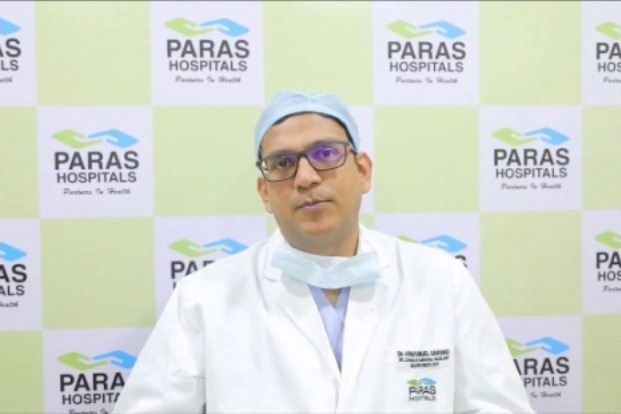
Mar 2, 2024
30% Gastrointestinal Cancer patients in India get their diagnosis in stage 4 – Leading cause of death

Gastrointestinal (GI) Cancers are one of the most common cancers worldwide. Overall, the GI tract and the accessory organs of digestion (pancreas, liver, gallbladder) are responsible for more cancers and more deaths from cancer than any other system in the body. According to recent studies, more than 30% of the patients who are diagnosed with GI cancer are diagnosed late and start their first line of treatment in stage 4 – an advanced stage of cancer, which is characterized with the exponential progression of the cancer cells, leading to lower survival chances.

According to Dr Vinay Samuel Gaikwad, HOD GI Cancer Surgery, Paras Hospitals, Gurgaon, “The most important aspect with GI Cancers are the silent signs and symptoms. Majority of the patients consider alarming signs such as constipation, blood in stool, indigestion or persistent heartburn as routine ailments and end up just opting for home remedies to address the same. It is important for us to understand that if any symptom turns chronic and if the patient does not get any relief within 1 week, consulting a doctor is a must.”
The gastrointestinal (GI) cancers include tumours of the gallbladder, liver, pancreas, bile duct, oesophagus, stomach, small intestine, colon, rectum and anal canal.
Spot the signs of GI Cancer :
Dr Vinay who actively performs surgeries to treat GI Cancers highlights,” There are certain signs that are common to most cancers that one can watch out for. These include an unexplained loss of appetite, significant loss of weight, and swelling in the body especially near the site of the cancer. Specific signs can be present for specific tumour sites.”
Medical data also highlights that in India – Oesophageal cancer or Cancer of the tube that runs from the throat to the stomach is most wide spread and is also considered as one of the most aggressive GI Cancers. However every cancer has its peculiar signs and symptoms, which are due to the organs of origin.
Dr Vinay shares, “Oesophageal cancer can manifest with difficulty in swallowing first to solids and later to liquids. Stomach cancer can present with acidity, burning in the upper abdomen, bleeding in the vomitus, and black coloured stool. Small intestinal cancer can present as central abdominal pain which is usually crampy in nature as well as altered bowel habits. Colon and rectal cancer presents usually with fresh blood in the stool, altered bowel habits, or obstruction of stool manifesting in the form of abdominal distension, constipation, or vomiting.”
30% late diagnosis statistic: Valid for both Urban & Rural Population
Another aspect highlighted is that the late diagnosis, detection and treatment figures are not limited to the rural areas only, in urban areas also the statistic holds true!
Dr Anukalp Prakash, Sr Consultant Gastroenterology, shares, “On a daily basis we get a mix of patients from urban and rural areas suffering from chronic gastrointestinal ailments that are ignored for numerous months and in many cases years. The results are medical complications, including cancer, that drastically starts affecting the life of the patient. Sadly on a daily basis, we end up referring to at least one such case to the cancer department. Pancreatic cancer and oesophageal cancer are the most common.”
Prevention is better than cure:
Dr Vinay shares, “ People with one or more persons in the family (blood relation) who have been diagnosed with cancer have a higher risk and should be more attentive. Appropriate examination and investigations should be advised, as per the demand of the situation. Prevention is better than cure, so routine check-ups are recommended with increasing age to identify cancer sometimes even before it is fully developed. A family history of cancer is also a reason to undergo regular health checkups.”
By being aware of the signs, it is possible to detect these cancers early. These cancers can then be treated, and cure is a distinct possibility. So spot the signs of these cancers so that you or your loved ones can be rid of the same, might they ever occur.
